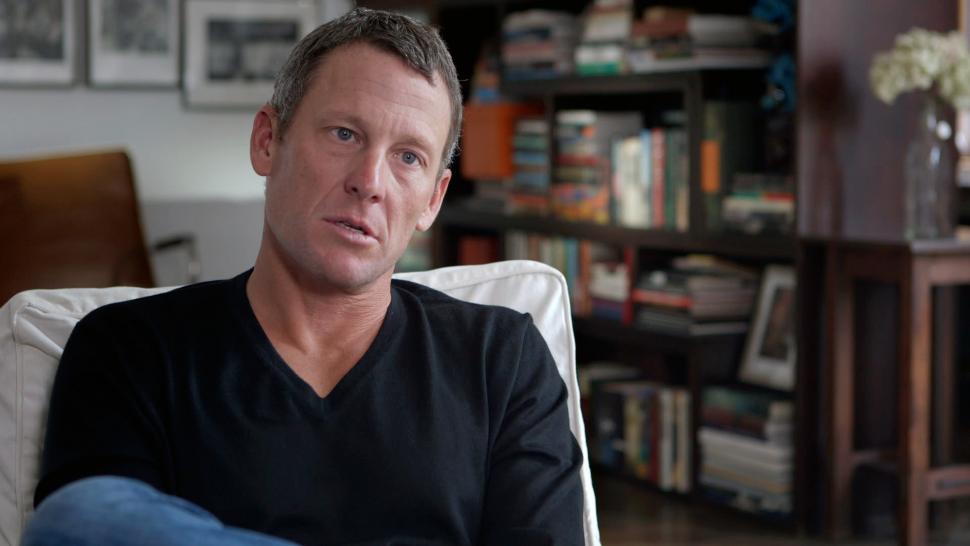- News
- Reviews
- Bikes
- Accessories
- Accessories - misc
- Computer mounts
- Bags
- Bar ends
- Bike bags & cases
- Bottle cages
- Bottles
- Cameras
- Car racks
- Child seats
- Computers
- Glasses
- GPS units
- Helmets
- Lights - front
- Lights - rear
- Lights - sets
- Locks
- Mirrors
- Mudguards
- Racks
- Pumps & CO2 inflators
- Puncture kits
- Reflectives
- Smart watches
- Stands and racks
- Trailers
- Clothing
- Components
- Bar tape & grips
- Bottom brackets
- Brake & gear cables
- Brake & STI levers
- Brake pads & spares
- Brakes
- Cassettes & freewheels
- Chains
- Chainsets & chainrings
- Derailleurs - front
- Derailleurs - rear
- Forks
- Gear levers & shifters
- Groupsets
- Handlebars & extensions
- Headsets
- Hubs
- Inner tubes
- Pedals
- Quick releases & skewers
- Saddles
- Seatposts
- Stems
- Wheels
- Tyres
- Health, fitness and nutrition
- Tools and workshop
- Miscellaneous
- Tubeless valves
- Buyers Guides
- Features
- Forum
- Recommends
- Podcast
news
 Lance Armstrong Photo by Maryse Alberti, Courtesy of Sony Pictures Classics
Lance Armstrong Photo by Maryse Alberti, Courtesy of Sony Pictures ClassicsFederal judge sets November trial date for $100 million Lance Armstrong whistleblower case
A trial date of 6 November 2017 has been set for the Lance Armstrong whistleblower case after a federal judge dismissed an attempt by lawyers acting for the disgraced cyclist to defer the trial until next year.
US district judge Christopher Cooper last week dismissed a call by Armstrong’s legal team to give summary judgment on the long-running case, instead ordering that it be tried by a jury.
> Judge orders Armstrong case to be sent for trial by jury
The lawsuit was initially brought under ‘whistleblower’ legislation called the False Claims Act by Armstrong’s former team mate at the United States Postal Service (USPS), Floyd Landis.
He alleged that Armstrong and others had misused federal funds, in the form of sponsorship money, to finance the doping programme that would brought Armstrong seven Tour de France victories between 1999 and 2005.
The US Department of Justice joined the action after Armstrong, banned from cycling for life in 2012 and stripped of those Tour de France victories, finally confessed to doping early the following year.
Should the case go against the 45-year-old, it could cost him up to $100 million – three times the amount USPS paid in sponsorship. If so, Landis – himself stripped of the 2006 Tour de France title for doping – would receive a substantial cut of the damages as the person who brought the action.
Armstrong’s attorneys had argued that USPS had suffered no damage because it had gained greater value from his successes than the $32.2 million it paid in sponsorship.
Judge Cooper dismissed that argument in a ruling delivered on Valentine’s Day, saying:
Because the government has offered evidence that Armstrong withheld information about the team’s doping and use of [performance-enhancing drugs] and that the anti-doping provisions of the sponsorship agreements were material to USPS’s decision to continue the sponsorship and make payments under the agreements, the Court must deny Armstrong’s motion for summary judgment on this issue.
He added:
The Court concludes that the monetary amount of the benefits USPS received is not sufficiently quantifiable to keep any reasonable juror from finding that the agency suffered a net loss on the sponsorship, especially if one considers the adverse effect on the Postal Service’s revenues and brand value that may have resulted from the negative publicity surrounding the subsequent investigations of Armstrong’s doping and his widely publicized confession.
Determination of damages must therefore be left to a jury. Accordingly, the Court declines to grant Armstrong summary judgment on damages and will set the case for trial.
That will now open on 7 November in Washington, DC - which means that the time that will have elapsed between Landis initiating the action and the trial starting will be longer than it took Armstrong to win seven editions of the Tour de France.
Simon joined road.cc as news editor in 2009 and is now the site’s community editor, acting as a link between the team producing the content and our readers. A law and languages graduate, published translator and former retail analyst, he has reported on issues as diverse as cycling-related court cases, anti-doping investigations, the latest developments in the bike industry and the sport’s biggest races. Now back in London full-time after 15 years living in Oxford and Cambridge, he loves cycling along the Thames but misses having his former riding buddy, Elodie the miniature schnauzer, in the basket in front of him.
I want to say, wow! holy cow ! seriously, it is very interesting to read this. So, I wonder if they are just buying this stuff off the shelf ie...
If the bike owner starts a crowdfund thing to help the security guard cover his costs etc. whilst he will undoubdtedly be off work, I'll contribute...
This a state version of the onion right ?...
I ask that you keep it on the down-low, I really dont want my local politicans to find out....thx
There was a Tony Robinson documentary about the Thames at night on Channel 5 iirc, where they go clean the Blackwall tunnel regularly at night. ...
Another Driverless car - oh. ...
Appears that the scheme installation has now been paused:...
Actually, having recently bought a cheaper, new helmet to replace a more expensive (but cracked) one, I would say that more expensive is better. ...
It's a lot of money for a simple-looking little tool, but I've been very happy with previous Dynaplugs - they are super effective.
A couple of call-outs from the Guardian piece:...